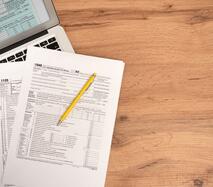Financial habits are established early in life, so it’s never too soon to start teaching teens the importance of budgeting and saving money. Here are five practical lessons for responsible money management.
1. Develop a Savings Habit
Teenagers should pay themselves first by putting a certain percentage of the money they earn into a separate savings account. Getting used to setting aside 10% will prepare them to create an emergency fund, save for their first home, and set money aside for a rainy day. You can also instill the value of philanthropy by encouraging your teen to give to an organization of their choice. If your teen’s employer offers direct deposit, show them how to set up an automatic transfer of funds from every paycheck into a separate savings account. If your teen needs an extra incentive, you could offer to add 1% or 2% to the total amount they save over a set period of time.
You might also consider helping your teen set up an automatic savings app, available through CU Rising’s resources. These apps are often free or low-cost, and linking them to their account can help your teen set savings goals and make automatic deposits, or round up purchases and move the difference into a savings account.
2. Use CU Rising’s Learning Resources
CU Rising offers various tools and resources to help teach your teens how to manage their money responsibly. For example, their interactive financial education platform includes activities and lessons that make it easier to talk to kids and teens about spending wisely and saving money. Additionally, CU Rising provides access to financial workshops that can help your teen learn about budgeting, saving, and understanding the power of compounding interest.
3. Differentiate Between Needs, Wants, and Wishes
The ability to distinguish between needs and wants will help your teen become a smart spender. Today’s teens live in a world of immediate gratification, so parents should explain financial goal-setting, which includes wishes, wants, and needs in both the short term and long term. Having conversations about needs and wants with teens not only helps them differentiate between the two but also teaches them to evaluate and make better financial decisions — such as opting for a more affordable used car over a new model. CU Rising offers budgeting tools that can help your teen understand how to allocate funds for needs, wants, and savings goals.
4. Keep a Record of Spending and Saving
A simple system to track spending can help your teen improve their financial habits over time. Encourage them to keep track of receipts and categorize their spending. CU Rising’s online banking tools, like My GreenInsights, make it easy for your teen to track their spending, evaluate past buying decisions, and make adjustments for the future. These tools can also help them better manage their budget and set goals for saving.
5. Establish a Financial Plan Together
When it’s time for your teen to decide how to spend money, help them set specific financial goals. Whether they want to save for a bike, a first car, or college expenses, setting clear objectives will guide them toward understanding how much they need to save. With CU Rising’s savings goal calculator and personalized financial resources, you and your teen can work together to develop a strategy that helps them reach their savings goals.
The earlier you begin talking to your teens about money, the better equipped they’ll be to make smart financial decisions as adults. Explore more tips and resources from CU Rising to help you teach your kids about money management.













